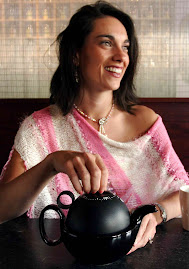Ok, onto the tea. Today I think is a good day to write about one's own discovery of tea. I have already gotten my blog on about the importance of slowing down every now and then to enjoy a cup of tea. But what brings people to become tea lovers and connoisseurs? The answer, of course, is different for everyone.
I think my first real tea drinking experience was when I took a semester abroad in Barcelona, Spain. I was about 19; and of course I had had tea before, from various Celestial Seasonings and Twinings tea bags out of my mom's cupboard when I was young, but nothing truly memorable. In any case, I discovered té con leche (tea with milk) at various cafés throughout the city. Now mind you these 2-euro cups were still nothing more than black tea bags, but there is just something amazing about the milk in Europe, and this magical leche with a bit of sugar and I was hooked. I have the best memories of stopping at little places here and there in the city and enjoying this tasty beverage with friends whilst skipping class, studying for finals, or simply taking a load off. I was back (I lived in Barcy when I was younger) in this big, awe-inspiring city, speaking Spanglish with friends, and enjoying my new most favorite daytime drink. I say daytime because the nighttime drinks were plentiful, and alcoholic, which is an entirely different blog for a different website.
I have had fond experiences with tea ever since I discovered it. People stumble across tea for all different reasons, but it seems to be a discovery that people stick with and continue to enjoy and learn about. Unlike food trends such as Olestra or clear Pepsi, tea has been around for thousands of years, and for good reason. It upholds ancient traditions, makes room for new ones, and brings people together. I just read an article about a man who had his father's ashes mixed with clay to make a teapot, because he missed his daily chats over tea with his dad. Hell, the reason our company even exists is due to our founder's devotion and love for tea and its health benefits.
Perhaps one of the greatest things about tea are the stories that it creates in people's lives; how they start drinking it, and what happens as a result. Everyone has a different tale to tell, so feel free to tell us yours.
Now this has all the makings of a truly great story!
Image courtesy of http://www.funnyjunk.com/.






